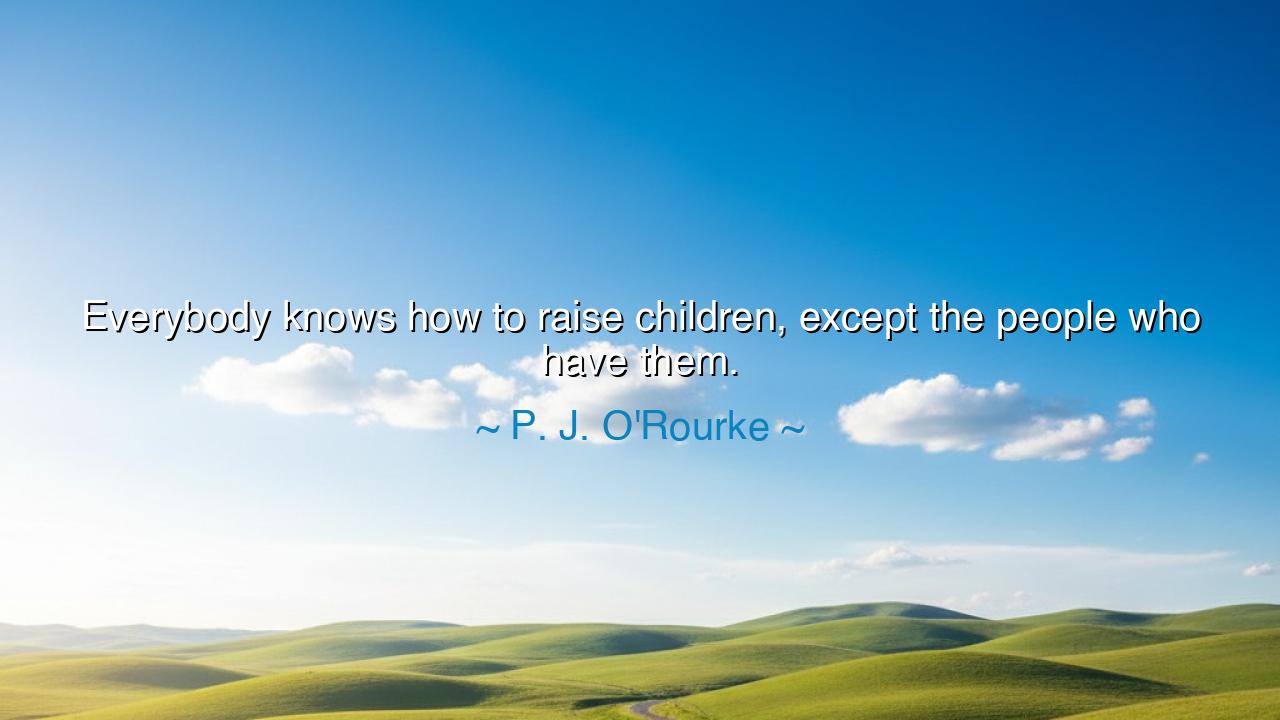
Everybody knows how to raise children, except the people who






In the sharp yet timeless words of P. J. O’Rourke, we are given a truth veiled in humor but heavy with wisdom: “Everybody knows how to raise children, except the people who have them.” At first, it sounds like a jest at the expense of parents, but beneath the laughter lies a profound observation of human life. The raising of children is among the greatest and most complex of tasks, and those who stand outside it always imagine it simpler than it truly is.
The meaning of the saying rests on the chasm between theory and practice. From the outside, one may look upon a child and say, “They should be more disciplined,” or, “If I were the parent, I would do this or that.” Such confidence comes easily when one bears no responsibility for the living soul before them. But once a man or woman holds a newborn in their arms—once the sleepless nights, the tears, the illnesses, the boundless needs unfold—the theories dissolve, and reality teaches a humbler truth. Thus, O’Rourke declares that those who do not carry the burden always imagine themselves wise, while those who carry it know how little they truly know.
History gives us many examples of this gap between judgment and experience. Consider Sparta, where children were raised by the harsh discipline of the state. Outsiders often admired the obedience and courage of Spartan youth, but mothers who bore those children often grieved the cost, for their sons were taken at seven and forged into warriors without choice. To the observer, the method seemed effective. To the parent, it was agony. So too, in every age, the raising of children appears simple until one feels the daily weight of love and responsibility.
There is also in this quote a hidden mercy, for it reminds us that parents are not to be measured by perfection. They stumble, they struggle, they doubt. They cannot always follow the advice of philosophers or experts because the child before them is not an idea but a living, breathing, unpredictable being. Each child is a mystery, and each parent must learn anew what it means to nurture, discipline, and love. The arrogant voice that claims certainty without experience knows only the shadows, not the substance, of parenthood.
Yet O’Rourke’s words are not meant to mock parents alone—they also warn against the pride of judgment. It is easy to look upon the labors of others and imagine we know better. It is harder, and wiser, to approach with humility, compassion, and the understanding that life’s greatest duties cannot be solved by simple formulas. This applies not only to raising children, but to all burdens of leadership, care, and love. Only those who bear the responsibility know the weight of it.
The lesson for us is thus: judge less, understand more. Do not be swift to declare what parents should or should not do, for you do not walk in their shoes. Instead, offer encouragement, support, and empathy. And if you yourself are a parent, release the burden of perfection. Know that doubt and struggle are not signs of failure, but signs that you are engaged in the sacred, difficult work of raising a soul.
Practical actions arise from this wisdom. If you are not a parent, resist the temptation to offer advice unless asked, and instead lend a hand—through babysitting, meals, or listening ears. If you are a parent, lean into community, share your struggles honestly, and learn not from critics but from those who walk the same path. Above all, remember that the measure of success is not flawless technique, but love, patience, and endurance.
Thus, the wit of P. J. O’Rourke becomes for us a timeless teaching. The raising of children is not a puzzle to be solved by distant voices, but a path to be walked with trembling hands and steadfast hearts. And though the world may think it knows the way, it is the weary, loving parent who learns, day by day, what it truly means to guide a life into the fullness of its being.






AAdministratorAdministrator
Welcome, honored guests. Please leave a comment, we will respond soon